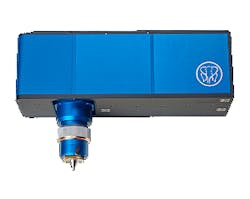Galvanometer scanner from Arges uses a femtosecond laser
The Elephant is a seven-axis galvanometer-driven scanner for advanced drilling applications. Using a femtosecond laser, the system provides fast ablation with minimal thermal influence on the surrounding area. With flexible hole diameters and geometries, it is available with apertures of 16, 21, and 31 mm and wavelengths of 355, 532, 1064, and 1550 nm.Arges
Wackersdorf, Germany[email protected]More Products ----- PRESS RELEASE Scanning system for demanding drilling applications At the LASYS 2012 ARGES will present a product of their 3D-scanhead-series, the precession ELEPHANT. The precession ELEPHANT is a 7 axes galvanometer driven scanning system for advanced drilling applications. Particularly in combination with femtosecond lasers the full potential of the scan head becomes obvious, very good spot performance and short pulse and ultra-high repetition rates allow a fast ablation of different materials with minimal thermal influences on the surrounding area of the processing zone. The adaption of the precession ELEPHANT for the use with ultra-short pulsed lasers made it possible to create flexible hole diameters and geometries like ellipsoidal holes with a high aspect ratio. Especially for holes with a variable geometry the precession ELEPHANT is the perfect scanning solution. Together with the ARGES-InScript-software, the ARGES System Controller and a suitable beam source the system can also be easily integrated into industrial manufacturing. In its standard version the product is available with the apertures 16, 21 and 31 mm and for wavelengths of 355, 532, 1064 or 1550 nm. Extensive tests allow the ARGES-application team to define individual system specifications and process parameters, whereby optimal results can be guaranteed. The possibility to create holes with no burr on the inlet and outlet sides and no thermal effects on the material and additionally the extreme low roughness level on the wall of the holes open up a broad range of applications for this scanning technology, e.g. in filter industry, textile industry, the medical technology or various applications in the field of materials sciences. One application that requires high precision is the drilling of nozzles e.g. drilling of conical holes for diesel fuel injectors, gas injectors or standard fuel injectors. In these laser processes the requirements for processing time, flexibility and quality of micro holes are very high and come along with the demand for a high reproducibility. The scanning system is exactly adjusted to fulfill these requirements. Adjustable hole geometries allow to create holes with defined tapers (negative, zero or positive) and taper angle ranges of up to 10°. This brings out micro holes with a hole diameter range of 50 to 500 µm and a diameter repeatability of <0.4%. The cycle time at the drilling of injector nozzles is <2 sec per hole (200 µm diameter; 200 µm thick 440 stainless steel). -----Follow us on Twitter Follow Laser Focus World on your iPhone or AndroidSubscribe now to Laser Focus World magazine; it's free!
Wackersdorf, Germany[email protected]More Products ----- PRESS RELEASE Scanning system for demanding drilling applications At the LASYS 2012 ARGES will present a product of their 3D-scanhead-series, the precession ELEPHANT. The precession ELEPHANT is a 7 axes galvanometer driven scanning system for advanced drilling applications. Particularly in combination with femtosecond lasers the full potential of the scan head becomes obvious, very good spot performance and short pulse and ultra-high repetition rates allow a fast ablation of different materials with minimal thermal influences on the surrounding area of the processing zone. The adaption of the precession ELEPHANT for the use with ultra-short pulsed lasers made it possible to create flexible hole diameters and geometries like ellipsoidal holes with a high aspect ratio. Especially for holes with a variable geometry the precession ELEPHANT is the perfect scanning solution. Together with the ARGES-InScript-software, the ARGES System Controller and a suitable beam source the system can also be easily integrated into industrial manufacturing. In its standard version the product is available with the apertures 16, 21 and 31 mm and for wavelengths of 355, 532, 1064 or 1550 nm. Extensive tests allow the ARGES-application team to define individual system specifications and process parameters, whereby optimal results can be guaranteed. The possibility to create holes with no burr on the inlet and outlet sides and no thermal effects on the material and additionally the extreme low roughness level on the wall of the holes open up a broad range of applications for this scanning technology, e.g. in filter industry, textile industry, the medical technology or various applications in the field of materials sciences. One application that requires high precision is the drilling of nozzles e.g. drilling of conical holes for diesel fuel injectors, gas injectors or standard fuel injectors. In these laser processes the requirements for processing time, flexibility and quality of micro holes are very high and come along with the demand for a high reproducibility. The scanning system is exactly adjusted to fulfill these requirements. Adjustable hole geometries allow to create holes with defined tapers (negative, zero or positive) and taper angle ranges of up to 10°. This brings out micro holes with a hole diameter range of 50 to 500 µm and a diameter repeatability of <0.4%. The cycle time at the drilling of injector nozzles is <2 sec per hole (200 µm diameter; 200 µm thick 440 stainless steel). -----Follow us on Twitter Follow Laser Focus World on your iPhone or AndroidSubscribe now to Laser Focus World magazine; it's free!
